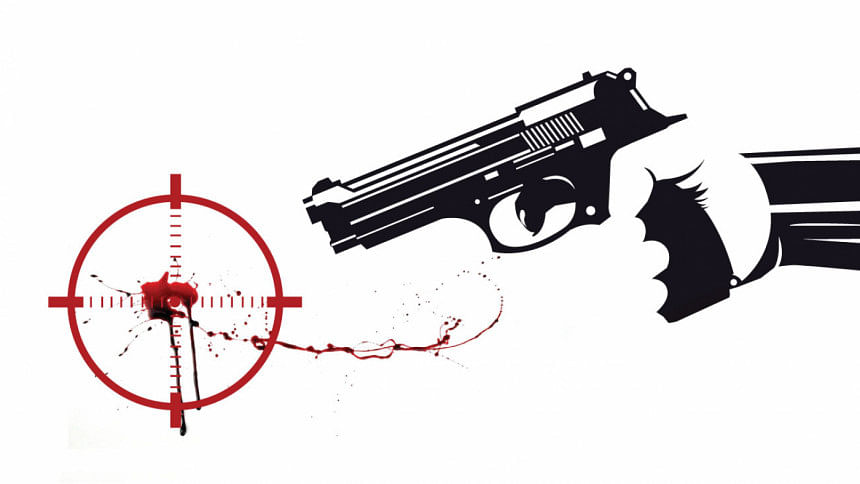‘Shootout-Deaths’ in Custody: Law enforcers liable only on paper

On September 4 last year, Belal Hossain, an accused in several cases, surrendered to Khulshi Police Station under Chattogram Metropolitan Police with intent to return to a normal life.
After he surrendered, police took him in their custody.
Hours later, they claimed he was killed in a gunfight, which allegedly took place when they took him to Jalalabad area to recover firearms.
Law enforcers are by law required to protect people in their custody. However, after arrests, detentions or surrenders, stories of such "shootouts, crossfires or gunfights" have become regular.
Section 328 (a) of the Police Regulation reads: "The officer-in-charge of a police station or post shall be responsible for the safe custody of all prisoners brought to the station or post."
But no officials concerned or team members have so far been held accountable for the deaths of people in their custody in these so-called shootouts.
On the contrary, they have enjoyed impunity after every incident, rights activists alleged.
"The life and safety of anyone taken in custody is the responsibility of the custodian. Whether taking him [the person in custody] to a raid or weapon recovery, his safety, according to the law, is of utmost importance," said rights activist Nur Khan Liton.
He added, "But what we are seeing now is one arrestee after another being killed in so-called shootouts in the name of raids. Meanwhile, the custodian police officers are enjoying impunity, which too is against the law."
Since 2004, around 1,000 people out of at least 2,850 victims of "shootouts, gunfights or crossfires" were killed after their arrest, detention or surrender, according to rights body Ain o Salish Kendra.
Over the years, many of the victims' families accused police and Rab officials of killing their loved ones in the name of "crossfire". At times, families also claimed their relatives were victims of "contract killing" by law enforcers. Many family members and rights activists alleged that law enforcers killed the people and described the incidents as "shootouts" to cover up the murders -- allegations that law enforcers always deny.
Legal experts say law enforcers cannot avoid their failure in protecting people in custody, even if the "gunfights" really took place.
But there has been no instance of any official being held responsible for not being able to protect those in custody.
Police and Rab offer mainly two identical narratives after such "shootouts".
One narrative, particularly for those killed in custody, is similar to the narrative police came up with after Belal's death.
In this case, as the police or Rab version goes, they took the detainee for a drive to recover arms or drugs or to arrest other criminals.
Suddenly, the "criminal's cohorts came out of the blue and started firing at the law enforcers, who fired back in self-defence. And the victim, caught in the line of fire, was hit and killed".
After killing of Mesbah Uddin Tarek, a 24-year-old garment worker, on September 14, 2014, a day after he was picked up, detectives of Dhaka Metropolitan Police cooked up a similar story.
While family members do not usually file a case against cops, Mesbah's father filed a case with a Dhaka Court against 10 people, including seven officials of the Detective Branch of police. But after nearly five years of legal battles, he was forced to negotiate with the accused and withdraw the case.
As a result, the police men faced no action for the death of a young man, while the police department also took no steps against the accused for their failure to protect a man in their custody.
In a rare incident, seven police personnel, including immediate past Teknaf Police Station officer-in-charge Pradeep Kumar Das, were taken in custody on Thursday after they were made accused in the murder of Major (retd) Sinha Md Rashed Khan in Cox's Bazar on July 31.
After the death of Sinha, the second and more common narrative was used -- the victim "was killed in a gunfight" when law enforcers went to carry out raids on information. Police claimed that the ex-major had aimed his gun at the law enforcers first before they "retaliated" and killed him.
Usually in this narrative, law enforcers don't pick up the victim beforehand. However, many victims' families alleged that their loved ones were picked up before being killed in the so-called crossfires.
Meanwhile, Inspector General of Police Benazir Ahmed on Wednesday said he would not label the incidents as "crossfires", even though the narratives come from police themselves after each incident.
"NGOs use the word," the IGP said, adding that they bring money from abroad talking about different issues.
There are many things they can say to justify that (the money they bring in) and crossfire is one of them, he said during a joint briefing with army in Cox's Bazar after the Sinha killing.
Even now, top police and Rab officials maintain that gunfights take place only when they are attacked by criminals.

 For all latest news, follow The Daily Star's Google News channel.
For all latest news, follow The Daily Star's Google News channel. 



Comments